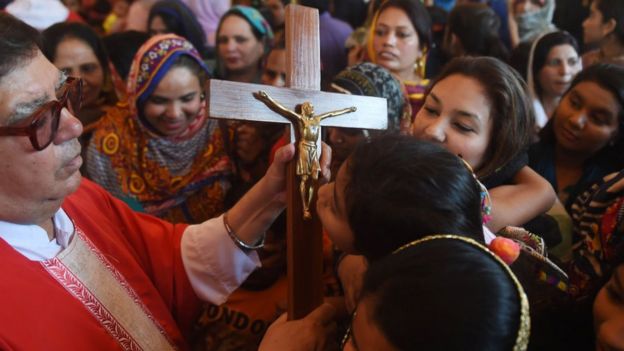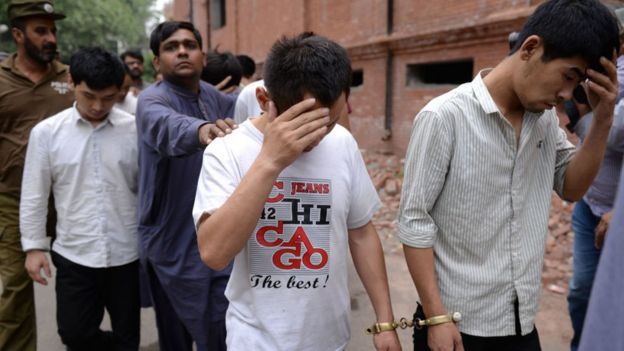By Salman Masood and Amy Qin

Rabia Kanwal and Zhang Shuchen were married in Islamabad in January. Eight days after they went to his home in China, she left to return to Pakistan.
ISLAMABAD, Pakistan — Rabia Kanwal’s parents were sure her marriage to a wealthy Chinese Muslim she had just met would give her a comfortable future, far from the hardships of their lives in Pakistan.
But she had a premonition.
“I was not excited,” said Ms. Kanwal, 22, who lives in a poor neighborhood in the city of Gujranwala, in the eastern province of Punjab.
“I was not excited,” said Ms. Kanwal, 22, who lives in a poor neighborhood in the city of Gujranwala, in the eastern province of Punjab.
“I felt something bad was going to happen.”
Arranged marriages are common in Pakistan, but this one was unusual.
Arranged marriages are common in Pakistan, but this one was unusual.
The groom, who said he was a rich poultry farmer, met Ms. Kanwal’s family during a monthslong stay on a tourist visa.
He had to use a Chinese-Urdu translation app to communicate with them, but over all, he made a favorable impression.
Ms. Kanwal went through with the wedding.
Ms. Kanwal went through with the wedding.
But upon moving to China with her new husband in February, she said, she was disappointed by what she found: He was a poor farmer, not a wealthy one.
Far worse, he was not a Muslim.
Within days, with the help of the Pakistani Embassy, she was back home and pursuing a divorce.
Hers was a relatively happy ending, though.
Hers was a relatively happy ending, though.
In recent weeks, Pakistan has been rocked by charges that at least 150 women were brought to China as brides under false pretenses — not only lied to, but in some cases forced into prostitution.
Others said they were made to work in bars and clubs, an unacceptable practice in Pakistan’s conservative Muslim culture.
At the same time, Ms. Kanwal’s story is not uncommon in China.
China has one of the most heavily skewed gender ratios in the world, with 106.3 men for every 100 women as of 2017, according to the World Bank.
At the same time, Ms. Kanwal’s story is not uncommon in China.
China has one of the most heavily skewed gender ratios in the world, with 106.3 men for every 100 women as of 2017, according to the World Bank.
That tilt is a product of nearly three decades of strict enforcement of China’s one-child policy and a preference for boys over girls — a combination that caused an untold number of forced abortions and female infanticides.
But the long-term human costs of this gender imbalance have only recently come into view — and they are having an impact far beyond China’s borders.
As the boys of the one-child policy era have begun to reach marriage age, the demand for foreign brides like Ms. Kanwal has surged, even as the Chinese government has loosened birth restrictions.
The allegations of trafficking are a disturbing aspect of China’s growing presence in Pakistan, a longtime ally drawn closer lately by expanding economic ties — including China’s Belt and Road infrastructure project.
More Chinese are coming to Pakistan as laborers and investors.
But the long-term human costs of this gender imbalance have only recently come into view — and they are having an impact far beyond China’s borders.
As the boys of the one-child policy era have begun to reach marriage age, the demand for foreign brides like Ms. Kanwal has surged, even as the Chinese government has loosened birth restrictions.
The allegations of trafficking are a disturbing aspect of China’s growing presence in Pakistan, a longtime ally drawn closer lately by expanding economic ties — including China’s Belt and Road infrastructure project.
More Chinese are coming to Pakistan as laborers and investors.
In the capital, Islamabad, shops and other businesses have begun catering specifically to them.
The Pakistani government has cracked down on brokers said to have arranged the marriages, arresting at least two dozen Chinese citizens and Pakistanis and charging them with human trafficking.
The Pakistani government has cracked down on brokers said to have arranged the marriages, arresting at least two dozen Chinese citizens and Pakistanis and charging them with human trafficking.
The Chinese Embassy denied that Pakistani brides were being mistreated in China.
But Human Rights Watch said last month that the trafficking allegations were “disturbingly similar” to past patterns in which women from other poor Asian countries — North Korea, Myanmar, Cambodia, Laos and Vietnam — were brought to China as brides and subjected to abuse.
“Both Pakistan and China should take seriously increasing evidence that Pakistani women and girls are at risk of sexual slavery,” the rights group’s China director, Sophie Richardson, wrote on its website.
Pakistani investigators said men in China paid the brokers to arrange marriages with local women, staying in rented houses in Pakistan until the weddings were performed.
But Human Rights Watch said last month that the trafficking allegations were “disturbingly similar” to past patterns in which women from other poor Asian countries — North Korea, Myanmar, Cambodia, Laos and Vietnam — were brought to China as brides and subjected to abuse.
“Both Pakistan and China should take seriously increasing evidence that Pakistani women and girls are at risk of sexual slavery,” the rights group’s China director, Sophie Richardson, wrote on its website.
Pakistani investigators said men in China paid the brokers to arrange marriages with local women, staying in rented houses in Pakistan until the weddings were performed.
The men covered the costs of the ceremonies, and in some cases they paid the women’s families the equivalent of thousands of dollars, investigators said.
None of that is illegal in Pakistan.
None of that is illegal in Pakistan.
The human trafficking charges come from the allegations that women were forced into prostitution or brought to China under false pretenses.
In some cases, investigators say, the men were provided with forged documents indicating that they were Muslim.
Other men sought out wives from Pakistan’s Christian minority, many of whom are impoverished and subjected to discrimination, investigators said.
Other men sought out wives from Pakistan’s Christian minority, many of whom are impoverished and subjected to discrimination, investigators said.
But virtually all of the women, Christian and Muslim alike, were drawn by the hope of better economic prospects.

Chinese men arriving at a courthouse this month in Islamabad, after being charged with trafficking women to China.
“My parents said that our neighbor’s girls were happy in China, so I would be, too,” Ms. Kanwal said.
She said she met her husband at the marriage broker’s office in Islamabad, where there were many other Chinese men and Pakistani women.
According to Ms. Kanwal, he told her family that he was Muslim and recited the first tenet of the Muslim faith, which every follower must know: “There is no God but God, and Muhammad is his prophet.”
But Ms. Kanwal never saw him pray, even when they visited the famous Faisal Mosque in Islamabad.
In February after the wedding, they flew to Urumqi, capital of the East Turkestan colony in western China.
But Ms. Kanwal never saw him pray, even when they visited the famous Faisal Mosque in Islamabad.
In February after the wedding, they flew to Urumqi, capital of the East Turkestan colony in western China.
After a brief stopover there, they flew on to Henan Province in central China.
Then, after a four-hour drive past fields of wheat and corn, they arrived at Dongzhang village in Shandong Province, where she saw her husband’s duck farm.
Then, after a four-hour drive past fields of wheat and corn, they arrived at Dongzhang village in Shandong Province, where she saw her husband’s duck farm.
It was not the sprawling operation of a wealthy man that she had envisioned, but a modest family farm where he lived with his parents and two brothers.
“They were not even Muslim and he had faked it all along,” she said.
“They were not even Muslim and he had faked it all along,” she said.
“There weren’t even proper washrooms in their house. I got agitated and started crying.”
Her husband, Zhang Shuchen, 33, tells a different story.
Over a meal of cold-tossed pig liver and stir-fried tomato and egg near his family home in Dongzhang, the boyish farmer acknowledged that he had traveled to Pakistan late last year and paid around $14,500 to a Chinese broker in the hopes of bringing home a Pakistani bride.
It was his first visit to Pakistan, he said, and the poverty there reminded him of China in the 1980s and ’90s.
Her husband, Zhang Shuchen, 33, tells a different story.
Over a meal of cold-tossed pig liver and stir-fried tomato and egg near his family home in Dongzhang, the boyish farmer acknowledged that he had traveled to Pakistan late last year and paid around $14,500 to a Chinese broker in the hopes of bringing home a Pakistani bride.
It was his first visit to Pakistan, he said, and the poverty there reminded him of China in the 1980s and ’90s.
When he first met Ms. Kanwal, he said, he liked her.
But he said he was upfront with her that while he had converted to Islam on paper, he was not a true believer.
“I told her I wasn’t a Muslim,” Mr. Zhang said in an interview.
“I told her I wasn’t a Muslim,” Mr. Zhang said in an interview.
He added that Ms. Kanwal had taught him the first principle of the Muslim faith.

Ms. Kanwal back in Gujranwala, her hometown. She said her stay in China was “horrible and beyond words.”
Ms. Kanwal later stood by her insistence that she did not know Mr. Zhang was not Muslim, and denied she had taught him the first principle.
Previously a logistics warehouse worker in southern China, Mr. Zhang said he now earned about $2,900 a month farming ducks, far more than the $180 or so that the average Chinese farmer made per month in 2018, according to China’s National Bureau of Statistics.
The New York Times was unable to independently verify Mr. Zhang’s income.

Ms. Kanwal back in Gujranwala, her hometown. She said her stay in China was “horrible and beyond words.”
Ms. Kanwal later stood by her insistence that she did not know Mr. Zhang was not Muslim, and denied she had taught him the first principle.
Previously a logistics warehouse worker in southern China, Mr. Zhang said he now earned about $2,900 a month farming ducks, far more than the $180 or so that the average Chinese farmer made per month in 2018, according to China’s National Bureau of Statistics.
The New York Times was unable to independently verify Mr. Zhang’s income.
But on a recent visit to the Zhang family home, a Times reporter found a newly built housing compound with multiple bedrooms and shiny tile floors.
Outside the family home, Mr. Zhang’s mother, who is in her 60s, recalled being puzzled by Ms. Kanwal’s reactions.
“She is religious, so when she came here I went out of my way not to give her any pork,” she said, as a small guard dog barked nearby.
Outside the family home, Mr. Zhang’s mother, who is in her 60s, recalled being puzzled by Ms. Kanwal’s reactions.
“She is religious, so when she came here I went out of my way not to give her any pork,” she said, as a small guard dog barked nearby.
“I stir-fried chicken and made egg omelets for her. But no matter what I served her, she just refused to eat.”
Ms. Kanwal said the family locked her in a room for two days, trying to pressure her to stay. (Mr. Zhang denied the accusation.)
Ms. Kanwal said the family locked her in a room for two days, trying to pressure her to stay. (Mr. Zhang denied the accusation.)
She managed to email the Pakistani Embassy, whose staff connected her through to the Chinese police, who took her away and made arrangements with the embassy for her return to Pakistan.
Her stay in China lasted eight days.
Her stay in China lasted eight days.
She said it was “horrible and beyond words.”
“I prayed daily for hours, asking God to take me safely back to my country, to my people,” Ms. Kanwal said.
“I prayed daily for hours, asking God to take me safely back to my country, to my people,” Ms. Kanwal said.
This month, she filed for divorce at a family court in Gujranwala, saying in her application that Mr. Zhang forced her into “immoral activities” and that she “would prefer to die instead of living with him.”
After news outlets in Pakistan reported the raids and the trafficking charges, the Chinese Embassy there said it supported the government’s efforts to combat crime.
After news outlets in Pakistan reported the raids and the trafficking charges, the Chinese Embassy there said it supported the government’s efforts to combat crime.
But it denied that Pakistani wives in China had been forced into prostitution or that their organs had been harvested.
Around the same time that Ms. Kanwal returned to Pakistan, the local marriage agency that many local men in the Dongzhang area had consulted for help in finding Pakistani wives was shuttered.
Around the same time that Ms. Kanwal returned to Pakistan, the local marriage agency that many local men in the Dongzhang area had consulted for help in finding Pakistani wives was shuttered.
But according to Mr. Zhang and other villagers in Dongzhang, there are still a number of Pakistani women in the area.
Two Pakistani wives in a neighboring village are said to be pregnant.
“There are no girls here,” said Mr. Zhang’s mother, when asked why so many local men had gone to Pakistan to find wives.
“There are no girls here,” said Mr. Zhang’s mother, when asked why so many local men had gone to Pakistan to find wives.
“We weren’t allowed to have more children, so everyone wanted boys.”

 Sophia (right) married a Chinese man after her pastor made introductions
Sophia (right) married a Chinese man after her pastor made introductions There are about 2.5 million Christians in Pakistan -- less than 2% of the population
There are about 2.5 million Christians in Pakistan -- less than 2% of the population
 More than two dozen Chinese nationals accused of luring girls into fake marriages have recently been arrested
More than two dozen Chinese nationals accused of luring girls into fake marriages have recently been arrested Sophia only managed to escape after her parents came to Lahore to rescue her
Sophia only managed to escape after her parents came to Lahore to rescue her Chinese companies are investing billions in Pakistan - and thousands of workers have arrived in recent years
Chinese companies are investing billions in Pakistan - and thousands of workers have arrived in recent years

 Millions of men struggle on the sidelines of China's ultra competitive marriage market, where a decades-long one-child policy and sex-selective abortions of daughters has resulted in a massive gender gap.
Millions of men struggle on the sidelines of China's ultra competitive marriage market, where a decades-long one-child policy and sex-selective abortions of daughters has resulted in a massive gender gap. 
 Tens of thousands of women from Mekong countries travel each year to marry Chinese husbands, plugging a gender gap incubated by Beijing's three decade-long one-child policy.
Tens of thousands of women from Mekong countries travel each year to marry Chinese husbands, plugging a gender gap incubated by Beijing's three decade-long one-child policy. 